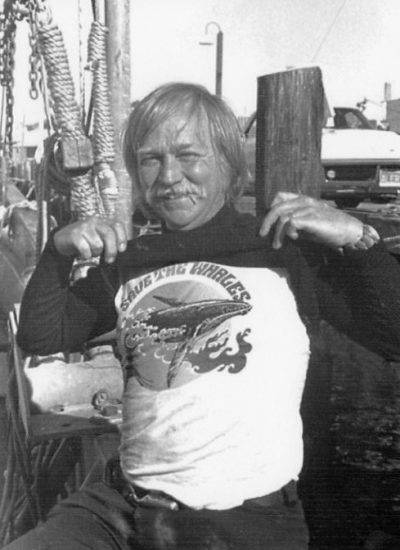
J. D. Mayhew models the Save The Whales T-shirt he designed for the Mendocino Whale War. He was aboard the Whale War boat Phyllis Cormack in San Francisco preparing to go on the 1976 anti-whaling voyage. (Photographer: Nicholas Wilson)
Each year when the Mendocino Coast Whale Festival kicks off, I am filled with memories of my artist grandfather, J.D. Mayhew. He fell in love with the ocean and whales when he was a Navy diver during WWII. After his stint in the service, he spent years as an illustrator and in advertising, but in the late 60s he decided he wanted to learn etching and to concentrate on whales. (He was also pretty good with mermaids.) That determination led him to the Mendocino Coast, where he built a home and studio on a bluff in the Todd’s Point area of Fort Bragg in 1971. From there, he could observe the whale migrations and other wildlife.
The same year, he founded the Mendocino Wildlife Gallery on Kasten Street in Mendocino, with three other artist friends; they called themselves the Wildlife Artists of Mendocino. Byrd Baker was one of the four and he shared my grandfather’s love for whales. At this time, there was a great deal of commercial whaling going on in the Pacific, some not far from here. In June, 1975, a Greenpeace Foundation boat filmed a Russian whaling fleet killing sperm whales off Cape Mendocino. When the footage was broadcast on national TV news, J.D., Byrd, and other Mendocino residents founded the Mendocino Whale War Association to bring attention to what the Russians and Japanese were doing.
The association organized the 1st Annual Whale Festival in Mendocino in March, 1976. It was a three-day educational event in the Art Center and Crown Hall with exhibits by animal rights and environmental groups; school children showed their whale art; lectures and films told the story. An art auction raised money to keep the effort afloat, but revenue was not the only goal, as grandfather pointed out: “If people love a painting of whales, they may also feel a bit more protective of the whales themselves.”
J.D.’s work for whales extended beyond the Whale War. In order to portray them accurately he spent his time studying and documenting their behavior, and visiting whaling museums in Nantucket and New Bedford, Massachusetts. An avid skin diver and underwater photographer, he made many trips to the Sea of Cortez and San Ignacio Lagoon in Baja California Sur, to Lahaina, Maui and other Hawaiian Islands, and to Alaska’s Inside Passage region to photograph and dive with whales.
In 1978, J.D. created the Gentle Giants of the Sea 1979 Whale Calendar, featuring 12 of his etchings of seven different whales and spinner dolphins. It was published by The Whale Protection Fund, a special project of the Center for Environmental Education in its campaign to end commercial whaling. In 1986, the International Whaling Commission passed a moratorium on commercial whaling, but Japan, Norway, and Iceland continue to do some.
Since I was very close to J.D. and my grandmother, Noretta, I grew up hearing bits and pieces of the Whale War story, but it wasn’t until I got older that I really got the whole picture. I remember Byrd Baker fondly; he was always around as part of my grandfather’s group of artist friends. A clear memory I have about the Whale War is the “Russian Defector’s Survival Kit” my grandfather created. It was a painted cabinet with a glass front that contained blue jeans, vodka, and a playboy magazine!
I am working to revive and digitally archive the incredible body of work he left behind, as well as to document and share his story. I started an online business, The Art of J.D. Mayhew, about two years ago, in response to an interest in my grandfather’s artwork that has continued long beyond his passing in 2004. If the message he wanted his work to convey could be distilled into a few words, they would be “Save the Whales,” of course! Beyond that, the relationships he established with other local artists were as important to him as his work itself. I believe these connections, in which the love and concern for wildlife are shared and expressed, spark the energy to take action, whether it be starting a movement or creating compelling artwork.
The Whale Festival starts in Mendocino on March 1st, with wine and chowder tasting around town. Shana Hadley will be on the Kelley House front lawn selling Mayhew prints, cards, and t-shirts. Inside the Kelley House there is a small exhibit about the Whale War. On Saturday, March 15th, the Kelley House and Noyo Center for Marine Science will co-sponsor a panel discussion about the state of the world’s whale population with some of the original Whale Warriors—Heidi Cusick Dickerson, Barry Cusick, Sally and Lee Welty—as well as Shana Hadley and the Noyo Center’s Katherina Audley. At the Kelley House, 4 pm; $7 members, $10 general public.